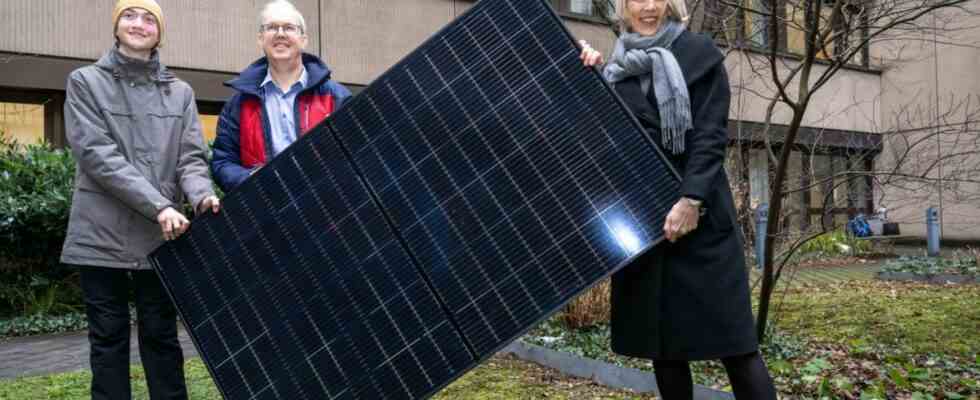Whenever the sun shines over Munich this winter – and that happened surprisingly often in November and December in particular – it triggers a pleasant feeling of contentment in Erich Hirsch. On days like this, the 56-year-old likes to use his tablet to find out via an app how much electricity is currently being produced on the balcony of his apartment in Neuhausen. Because since mid-October there have been two solar modules with a peak output of 600 watts, which covers around a fifth of the electricity requirements of an average household. For such a balcony power plant, you currently have to shell out almost 1000 euros. In the case of Erich Hirsch, however, almost a quarter of the acquisition costs are reimbursed – through the city’s “Climate-Neutral Buildings” subsidy program.
Its first stage came into effect in July; Since October 4, subsidies for building renovation and roof solar systems can also be applied for for balcony power plants. By the end of December, more than 1,000 Munich residents had done the latter – a multiple of what City Hall had expected. Erich Hirsch was the fastest, which is why he was invited to the department for climate and environmental protection on Tuesday. There, the family man received the very first funding notification from Katrin habenschaden (Greens), who described him as a “pioneer of the energy transition”. In addition, the mayor praises the 127 million euro funding program in the highest tones; according to her, it sets “unique incentives throughout Germany to participate in the local energy transition”. And in general she is “very, very, very happy” about the great interest.
So much enthusiasm is probably also due to the fact that there has rarely been anything positive to report in terms of Munich and solar power in the recent past – which is not least a thorn in the side of the Greens, ie Habenschaden’s party. Currently, only four percent of the city’s electricity requirements are generated by photovoltaic systems – although the potential in Munich with its 2000 hours of sunshine per year is actually huge.
If the mayor has her way, Munich should be the German solar capital
And yet the city regularly ranks lower in various rankings for the use of solar energy. She openly admits that “far too little has happened in recent years” on the subject of photovoltaics in Munich. But in the meantime the town hall coalition has raised the expansion targets. “We are witnessing the beginning of a decade of solar energy in Munich.” The aim is to “become the German solar capital”.
Of course, it’s a long way to get there, and it’s not least a challenge for the city itself. After all, they or their housing associations own an impressive seven percent of all buildings in Munich. The fact that there is so little progress in terms of photovoltaics has recently led to heavy criticism from the Greens in the city council. Their faction leader Dominik Krause even accused GWG and Gewofag of “preventive tactics”. Meanwhile, Andreas Horn, municipal solar coordinator for photovoltaics, points out that various solar strategies have been developed in recent years. The projects contained therein are now being implemented. “It takes a bit of patience,” says Horn, who admits, however: “We have a lot of catching up to do in this area.”
For Erich Hirsch, funding is only a marginal aspect
Meanwhile, the interest of the citizens in photovoltaics remains high. This was one of the main reasons why 1,500 solar systems with a total output of 11.2 megawatts peak went into operation last year – almost 15 percent more than in 2021. And yet the value is still well below the 15 megawatts peak that green-red in the envisaged a coalition agreement. According to Andreas Horn, this goal is to be achieved by 2024 at the latest. Other balcony power plants, such as Erich Hirsch’s, should also make a contribution – albeit a comparatively small one. The 56-year-old says that the fact that he was supported by the city when he bought it was only a side issue for him. The same applies to the money that he is now saving with solar power. “What counts most for me is the thought that I can now use the power of the sun and that I can generate electricity from it”.

